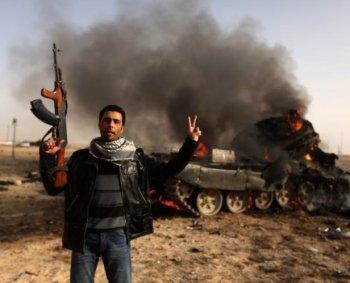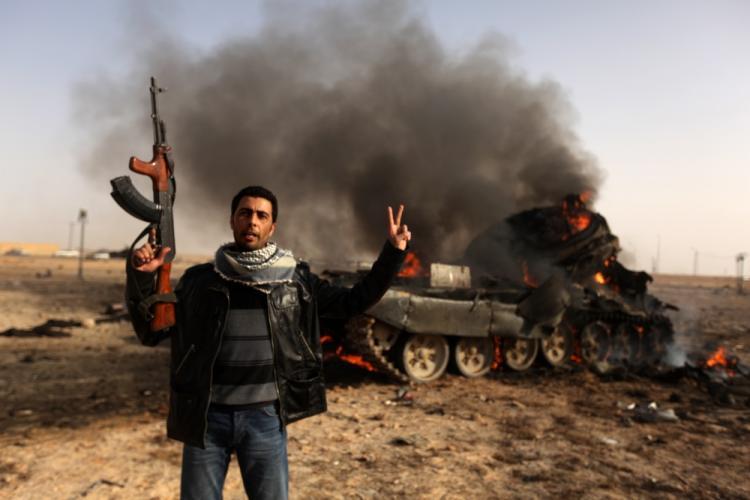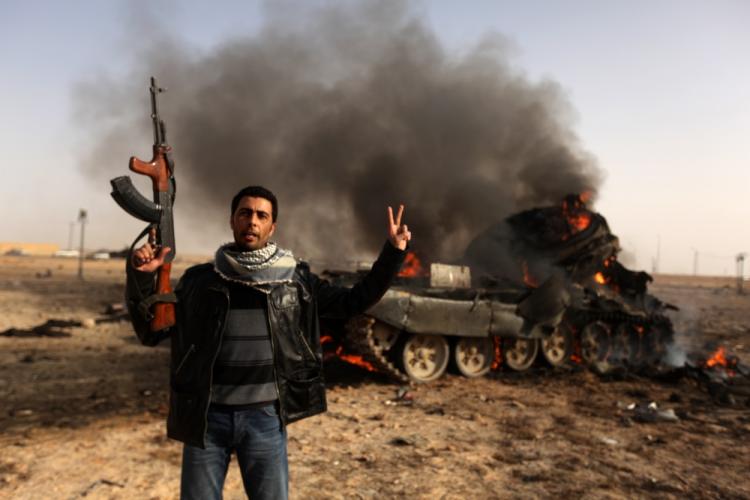With Gadhafi’s tanks swept out of the way by NATO fighter jets, Libyan opposition forces have been regaining much of the ground they lost over past weeks.
Rebels first took control of the city of Ajdabiya, located south of the opposition stronghold of Benghazi in Eastern Libya, then they marched on along the coastal highway retaking control over four more cities, Brega, Uqayla, Bin Jawad and Ras Lanuf.
The next city ahead is now Moammar Ghadafi’s birthplace Sirte, traditionally a stronghold of pro-Gadhafi forces.
A rebel commander told reporters on Sunday the rebels are planning “to free the rest of the Libya.” But with Sirte on their way and the capital Tripoli still uncontested, the most difficult part is yet to start for the rebels.
While opposition fighters celebrated every city they took control over, shooting their rifles into the air, they are aware they could have done little without the air support from NATO. NATO’s airstrikes against Gadhafi’s armored vehicles have been vital for the rebels’ advancement.
“The air strikes are helping us. They dealt a blow to Gadhafi’s forces and we feel relatively safe,” a rebel named Sami told Reuters.
Besides tanks, French warplanes destroyed five Libyan military planes and two helicopters as they were preparing to carry out strikes on the Libyan rebels, according to France’s armed forces.
Another rebel told Reuters that Gadhafi pulled his forces from Ajdabiyah and Brega to “put all his weight in attacking Misrata and winning so he can control the whole west versus losing the whole east.”
The battle for Misrata has been in full force, with Gadhafi’s forces besieging the city over the past week with heavy artillery and snipers. According to the rebels, the snipers have been targeting dozens of civilians from rooftops in Misrata.
Speaking at a press conference in Tripoli, a spokesperson for the Libyan regime called the air strikes conducted by NATO unfair. Saying NATO is prepared to “kill people, to destroy army training camps and to destroy army check points,” with the goal of improving negotiation conditions with Libyan authorities.
In announcing the change in command from the U.S. to NATO on Sunday, NATO Secretary General Anders Fogh Rasmussen reiterated that the alliance’s role is to protect civilians.
“Our goal is to protect civilians and civilian-populated areas under threat from the Gaddafi regime. NATO will implement all aspects of the U.N. resolution. Nothing more, nothing less,” said Rasmussen.
France had sought to keep the coalition forces in control of the mission, giving France a leading position instead of a smaller role under the NATO mission. Canadian General Charles Bouchard will be in charge of NATO operations. Turkey had objected to NATO taking over command saying the air raids on military targets went beyond the U.N. resolution aimed at protecting civilians.
On Sunday, U.S. defense secretary Robert Gates said the first phase of the mission, which mainly consisted of taking out Libyan air defense systems, had been completed and was largely successful.
“I think that we have prevented the large-scale slaughter that was beginning to take place, has taken place in some places. We are at a point where the establishment of the no-fly zone and the protection of cities from the kind of wholesale military assault that we have seen,” Gates said.
Rebels first took control of the city of Ajdabiya, located south of the opposition stronghold of Benghazi in Eastern Libya, then they marched on along the coastal highway retaking control over four more cities, Brega, Uqayla, Bin Jawad and Ras Lanuf.
The next city ahead is now Moammar Ghadafi’s birthplace Sirte, traditionally a stronghold of pro-Gadhafi forces.
A rebel commander told reporters on Sunday the rebels are planning “to free the rest of the Libya.” But with Sirte on their way and the capital Tripoli still uncontested, the most difficult part is yet to start for the rebels.
While opposition fighters celebrated every city they took control over, shooting their rifles into the air, they are aware they could have done little without the air support from NATO. NATO’s airstrikes against Gadhafi’s armored vehicles have been vital for the rebels’ advancement.
“The air strikes are helping us. They dealt a blow to Gadhafi’s forces and we feel relatively safe,” a rebel named Sami told Reuters.
Besides tanks, French warplanes destroyed five Libyan military planes and two helicopters as they were preparing to carry out strikes on the Libyan rebels, according to France’s armed forces.
Another rebel told Reuters that Gadhafi pulled his forces from Ajdabiyah and Brega to “put all his weight in attacking Misrata and winning so he can control the whole west versus losing the whole east.”
The battle for Misrata has been in full force, with Gadhafi’s forces besieging the city over the past week with heavy artillery and snipers. According to the rebels, the snipers have been targeting dozens of civilians from rooftops in Misrata.
Speaking at a press conference in Tripoli, a spokesperson for the Libyan regime called the air strikes conducted by NATO unfair. Saying NATO is prepared to “kill people, to destroy army training camps and to destroy army check points,” with the goal of improving negotiation conditions with Libyan authorities.
NATO Takes Full Command
On Sunday, NATO took over full command of military operations in Libya. Last week, NATO already took over control of the no-fly zone, but members were unable to reach an agreement on NATO taking over the air raids on military targets.In announcing the change in command from the U.S. to NATO on Sunday, NATO Secretary General Anders Fogh Rasmussen reiterated that the alliance’s role is to protect civilians.
“Our goal is to protect civilians and civilian-populated areas under threat from the Gaddafi regime. NATO will implement all aspects of the U.N. resolution. Nothing more, nothing less,” said Rasmussen.
France had sought to keep the coalition forces in control of the mission, giving France a leading position instead of a smaller role under the NATO mission. Canadian General Charles Bouchard will be in charge of NATO operations. Turkey had objected to NATO taking over command saying the air raids on military targets went beyond the U.N. resolution aimed at protecting civilians.
On Sunday, U.S. defense secretary Robert Gates said the first phase of the mission, which mainly consisted of taking out Libyan air defense systems, had been completed and was largely successful.
“I think that we have prevented the large-scale slaughter that was beginning to take place, has taken place in some places. We are at a point where the establishment of the no-fly zone and the protection of cities from the kind of wholesale military assault that we have seen,” Gates said.







Friends Read Free